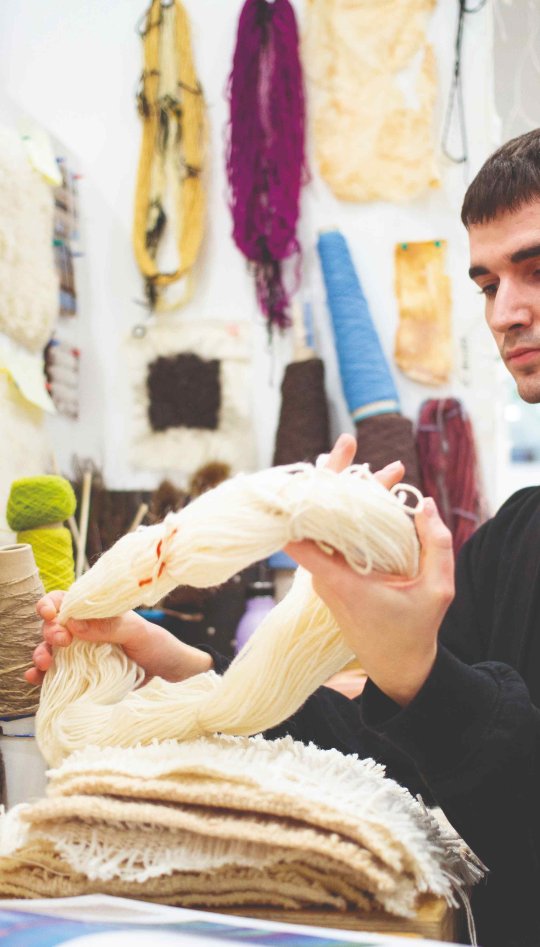
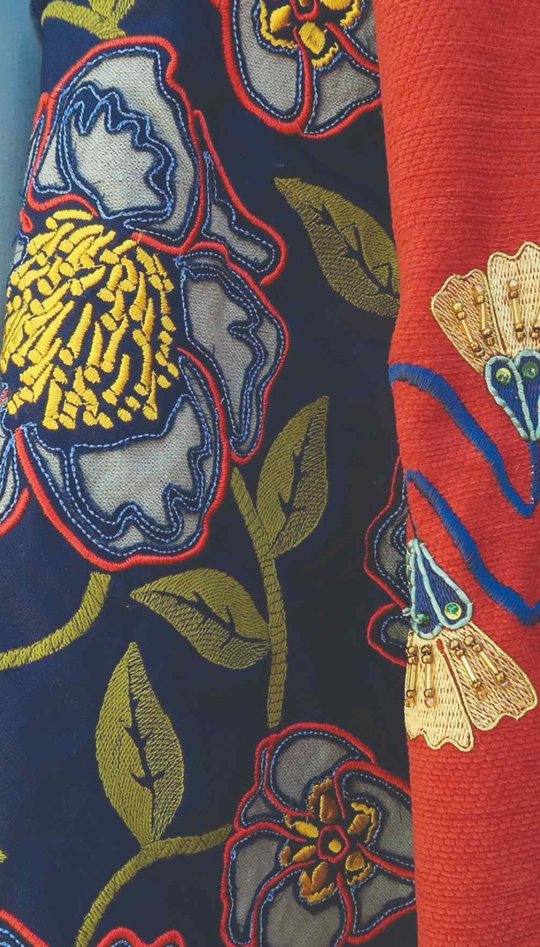
Textile Design BA(Hons)
Create sustainable textiles using innovative and traditional techniques.
Course overview
Join a new era in textile design, where the thread of sustainability runs through the creation of contemporary fabrics for fashion, interiors and art. On this Textile Design course, you’ll master traditional and digital processes as you innovate with weave, print and mixed media techniques, from 3D construction and natural dyeing to exquisite hand-embellishment with beading and embroidery.
Based in lively, industry-linked studios, on our Textile Design degree you'll be supported by professional designers and makers. You’ll develop confidence, technical expertise and critical judgment evidenced through your original and environmentally conscious textile designs.
You will:
-
Learn essential skills for woven, printed and mixed-media textiles, with sustainability embedded throughout
-
Work in fantastic facilities, using industry-standard kit such as industrial sewing machines, screen printing workshops, digital embroidery machines and weaving looms
-
Have opportunities to collaborate with degree students in areas such as fashion design, fashion marketing and interior design, across a range of projects
-
Take on live briefs set by companies such as The Natural Fibre Company, to boost your professional portfolio
-
Embrace artisanal, traditional craft methods – such as hand-dyeing using plants from our Dye Garden – alongside the latest mechanical and digital production techniques mirroring industry practice
-
Study at one of only six universities supported by the Worshipful Company of Weavers, which offers individual scholarships and educational grants
-
Have the chance to travel to events such as Première Vision, the international textile and trend forecasting show in Paris
Lead image: Megan Howell.
Course details
On this Textile Design degree, you'll have the opportunity to gain a BA(Hons) degree over three years or the option to study Textile Design BA(Hons) with an Integrated Foundation Year and/or professional placement study options.
Through this career-focused Textile Design degree, you’ll learn about technical process and production alongside environmental and sustainability issues surrounding the textile industry. You’ll learn how to design and make woven, printed and mixed media textiles for a broad range of outcomes, including fashion, interiors and one-off artefacts. Preparing for your career, you’ll also learn how to innovate and take creative risks, communicate professionally, network and approach potential employers.
The first year of the Textile Design course supports you to develop individual creative skills and a unique voice as a designer. The modules are designed to help you to become adept at deploying a range of textile production methods with consideration for responsible, environmentally sustainable design. In studio based practical projects, you'll be supported through tutorials and workshops with design development and technical textile processes.
You'll learn to use professionally equipped studios to create constructed and surface design textiles.
Modules
Colour and Pattern
In this practical module, you'll compile a journal focused on applied colour and pattern through a series of workshops.
Colour-related workshops include colour theory, the development of colour palettes, yarn and fabric dyeing, screen printing, hand embroidery and warp design.
Pattern-related workshops include explorations into the use of repeat, differing scale and placement of pattern, block printing, machine embroidery and weaving.
Belonging
You'll explore your personal identity as a textile designer through visual and contextual research related to colour and pattern.
You'll explore ideas of identity while working in mixed groups in an accepting and inclusive environment. You'll challenge prevailing narratives around race and cultural exclusions relating to marginality based on ability and disability, body size, religion, ethnicity, sexual orientation and gender.
Responsible Material and Design
Through a series of workshops, you'll create a journal of investigations related to fibre and materials.
You'll then demonstrate your knowledge and skills in the design and production of a range of textile samples.
Workshops include fibre analysis, natural dyeing, fabric handling and composition, print, weave, and mixed media processes, CMF (‘colour, material, and finish’) and the sustainable use of alternative surfaces and methods.
Histories
In this module, you'll produce your first piece of written work.
Through lectures and seminars, you'll examine the social history of dress through a range of perspectives, exploring the relationship between fashion, textiles and wider visual culture. You'll carry out research using real garments from Falmouth’s extensive Textiles and Dress Collection.
During the second year of your Textile Design course, you'll gain an understanding of the range of markets and audiences available to you, and learn to communicate your creative vision, concepts, and design narratives externally.
You'll be encouraged to take creative risks, working with a range of techniques and share the development of your practice in regular group tutorials. Advanced workshop processes are delivered in areas such as jacquard design, digital embroidery, and complex repeat design.
The year is characterised by communication, collaboration and professional practice by working on live briefs and entering competitions.
Modules
Process
You'll develop innovative and sustainable textile processes through traditional or unconventional means.
You'll select an area of textile exploration (for example; gold-work, cyanotype printing, woven pleats) and creatively experiment to push the boundaries of the technique, whilst adhering to an ethos of responsible and sustainable practice.
The emphasis on this module is creative risk-taking and the annotation of trial sampling rather than finished resolved textile pieces.
Connection
This module makes use of industry-facing design briefs, with work completed for an external client, partner, competition or exhibition.
You'll be taught advanced production techniques and develop personal investigations and creative design thinking with the guidance of your tutors.
You'll attend IT workshops and learn how to use digital textile technologies and software to create visualisations of your own designs.
Responsible Production
You'll develop advanced core skills that are essential to textile design; these are related to visual research, colour palettes and pattern fit for purpose.
You'll attend workshops on repeat pattern design and engineered design. You'll strengthen your knowledge of manufacturing and production methods in response to a raised awareness of conscious design practices in industry and related global environmental issues.
The emphasis in this module is investigation into process: the development of alternative iterations of designs, and development of advanced textile production skills such as digital embroidery, screen registration and woven production.
Collaboration
During this module, you'll build upon your communication skills, focusing on problem-solving, critical thinking, teamwork, listening, negotiation and reflection.
Joining interdisciplinary teams across the University, you'll work towards common set project goals which will enhance both your employability and communication skills.
Theories
In this module, you'll produce your second piece of written work.
You'll select a subject topic from ‘objects’, ‘bodies’, ‘identities’ or ‘representations’. Lectures and seminars are delivered following these themes.
Drawing on art and design history, cultural studies and media studies, lectures introduce theoretical approaches to practice.
Seminars provide a range of opportunities to explore theoretical texts relevant to practice.
You can choose to take an optional placement year after your second year on a three-year programme, or after your third year if you’re studying for a degree with an Integrated Foundation Year.
You’ll be responsible for finding your own placement, with support from the Employability team.
Choosing this option will enhance your industry experience and skills while studying.
How you’ll study during your professional placement
You’ll spend time working in a professional context, as part of a business or organisation. This can be in one role, or up to three, and must be for a minimum of 24 weeks.
You’ll develop in-demand workplace skills, deepen your insight into industry and grow your network of contacts, all of which could help you get ahead in your career after graduation.
Throughout this year, you’ll develop a portfolio of work that includes critical self-reflection on what has been learned from the experience. You’ll be required to evidence your experiences, the skills you’ve learned and your professional growth.
Alongside writing your dissertation, you’ll create your own studio briefs in order to design and produce original textiles. This usually (but not exclusively) takes the form of collections of samples.
You’ll also start creating your professional portfolio and other self-promotional materials, and have the chance to take part in the New Designers exhibition in London.
Modules
Futures
You'll build your own considered future-focused concepts for the creation of textiles with an enhanced awareness of global and sustainable contexts.
Innovation is encouraged through an experimental, process-driven approach to technical and material development making use of advanced production techniques.
Investigations
In this module, you'll complete a dissertation or equivalent, which arises out of agreed individual interests relating to your own creative practice.
Through group and individual tutorials, you'll determine the nature, form, breadth and depth of your guided independent study, then draft and produce a substantial body of work.
Innovate
You'll develop confidence, critical judgment, self-reliance, and the ability to communicate your skills, capabilities, and aptitudes to appropriate professional audiences before and after graduation.
The module is focused on the design and production of a body of work that forms a significant part of your portfolio and demonstrates your independence as a designer or practitioner.
Identity
Employability is at the centre of this module’s focus.
You'll identify your professional journey; understanding what makes you unique, knowing your options and ambitions and how to tell your own story as an individual designer.
You'll learn how to communicate professionally to potential employers and clients, and will be supported in the development of self-promotional material (digital and physical) focused on the next stage of your creative journey.
Why study an Integrated Foundation Year route?
If you’re taking on a new subject that you haven’t studied in depth before, have been out of education for a while or have a non-standard educational background then an Integrated Foundation Year degree may be the right choice for you. It is a four-year degree with an Integrated Foundation Year to start, which allows you to explore the primary elements of your subject before progressing on to the remaining three years of the BA(Hons) degree.
What you'll study in your Foundation year
If you choose this pathway, you'll study five core modules in your Foundation year. These are all designed to help you explore the foundational elements of your subject. You'll gain relevant technical skills, learn to experiment and take risks, develop an understanding of professional practice, have opportunities to work across disciplines and collaborate with other students on live project briefs.
Modules
Explore
You'll begin your foundation year by working collaboratively with others to explore themes of the future. You'll take risks, experiment through play and be supported to break through barriers.
Technique
You'll take subject-specific workshops and develop essential technical and practical skills in your area of study. You'll also enhance your analytical and organisational abilities.
Apply
You'll work with your peer group to think beyond discipline by addressing a societal or global issue. You'll then showcase your work to your peers and deliver and accompanying evaluation of your process.
Industry
You'll enhance your creative and practical skills in your subject specialism by responding to typical industry briefs, underpinned by focused research and experiments. You'll also gain industry insights through guest lectures and workshops.
Launch
You'll develop your unique identity in your specialism through the production of a self-initiated body of work. Your final project will be the bridge to your next year, fully supported by evaluative reviews and critical analysis of the work you have created.
After the Foundation year, you progress into Year One of the full three-year degree, equipped with a deeper knowledge of your subject, a clear understanding of your strengths, and develop a practical and technical skillset and the confidence to excel in your chosen subject.
If you apply for and enrol onto a degree with an Integrated Foundation Year, you’ll have the option to switch onto a five-year version including a placement year. That means you’ll complete the first three years of your course before completing a placement in industry in your fourth year and returning to Falmouth for the fifth year of your programme.
Lydia, a Textile Design student at Falmouth, shares the inspiration behind her print designs.
As part of our process of continuous improvement, we routinely review course content to ensure that all our students benefit from a high-quality and rewarding academic experience. As such, there may be some changes made to your course which are not immediately reflected in the content displayed on our website. During your course, module content may be updated or optional modules withdrawn in order to maintain the best academic experience. Any students affected will be informed of any changes directly.
From module information to course aims and assessment criteria, discover the full course details:
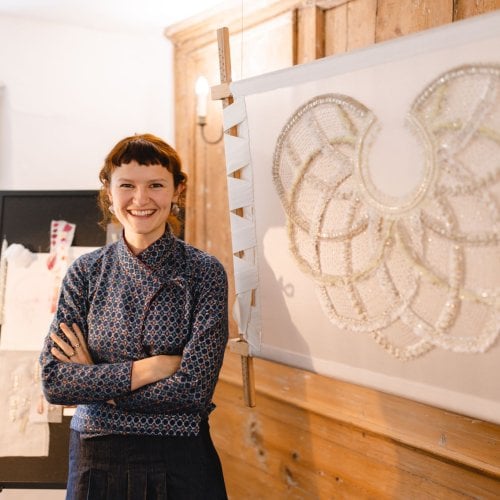
Credit: Oliver Holmes
"Without that support from Falmouth, I don’t think I would have won that New Designer of the Year award that led on to so much more "
- Beth Somerville, Textile Design graduate
Read Beth's storyHow you'll learn & be assessed
The Textile Design degree blends studio work with professional practice. You’ll learn through workshop-based studio modules, lectures, seminars, group and individual tutorials, and advanced workshops in certain disciplines. There may also be opportunities to visit major trade fairs like Première Vision in Paris.
At Falmouth, we use a 'digitally enhanced learning & teaching' approach. Your experience will always be predominantly in-person, including seminars, tutorials and studio teaching, with some, more targeted elements, being online either live (synchronous) or pre-recorded (asynchronous). You can read more here.
100% of your assessment will be coursework.
Assessment methods
There is formative and summative feedback given throughout your studies to help you progress your skills. This Textile Design course is also assessed via portfolio, journals, reports and written assignments:
- Portfolio assignments include research, development, and production of textiles. Portfolios often consist of a sketchbook, technical files and textile outcomes presented on sheets or in an appropriate manner
- Journals are formal ways of documenting the technical development and outcomes of projects
- Reports are used to describe your process and contribution on collaborative assignments
- Written assignments are assessed essays, for your cultural studies modules. There is a one written assignment per year
- Dissertation or final-year project
- Foundation year assessments are 100% coursework based
This course could be for you if...
- You're interested in textile creation and ideas
- You want to learn how to develop your creative abilities both intellectually and practically
- You've got a desire to think critically about your work and develop it over time
- You want to learn how to take a design from concept through to production
- You enjoy exploring new techniques and methods to push yourself
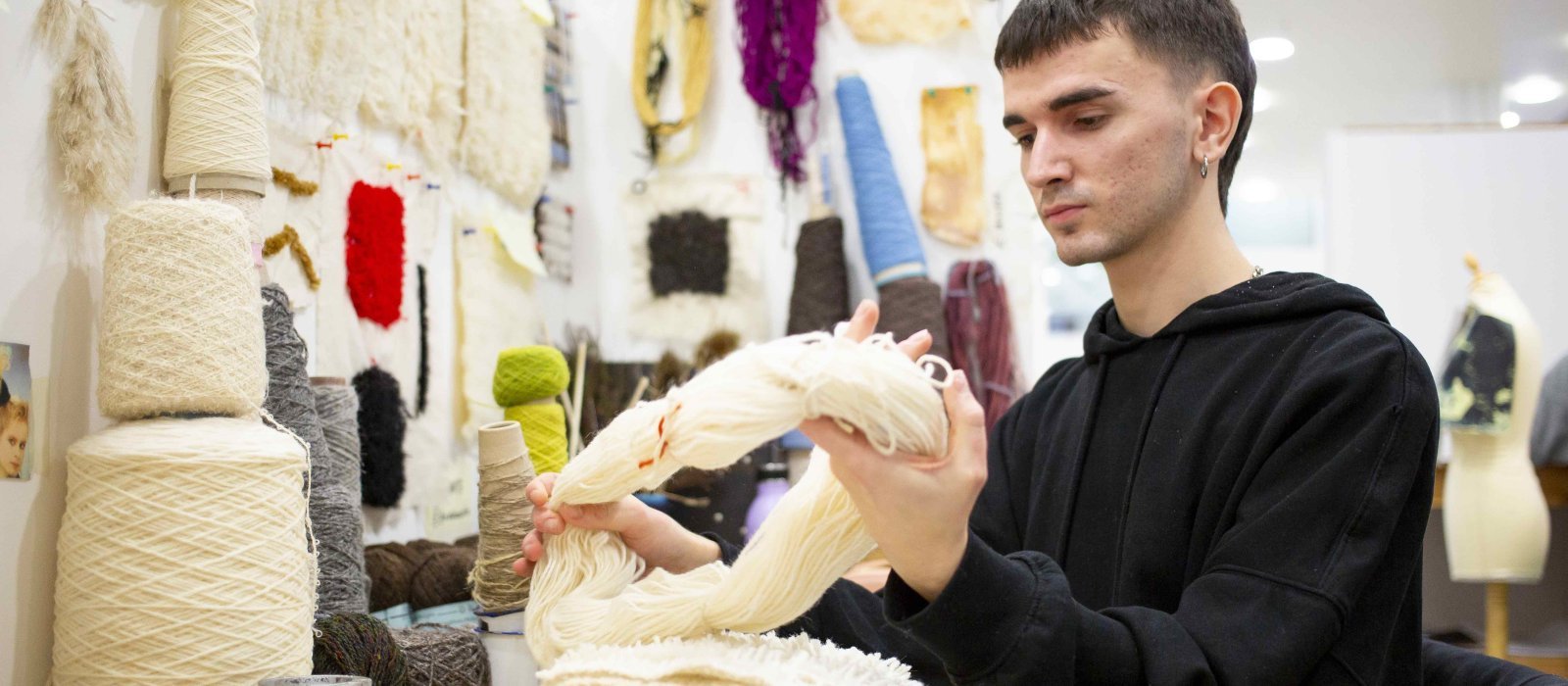
Stories from our community
Explore student projects, graduate successes, staff news and industry insights
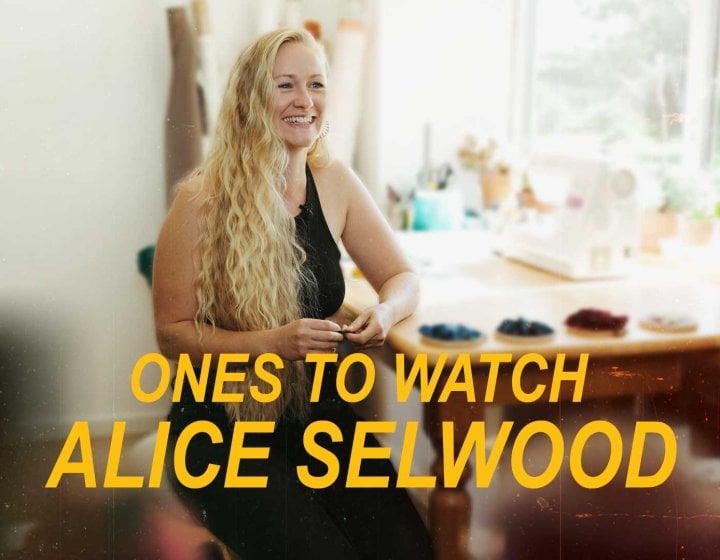
Fashion & Textiles alumna on freelance success, sustainability and the allure of Cornwall
03 October 2025
Alice Selwood is a multi-talented creative. Beginning her Falmouth journey on Textile Design BA, she...
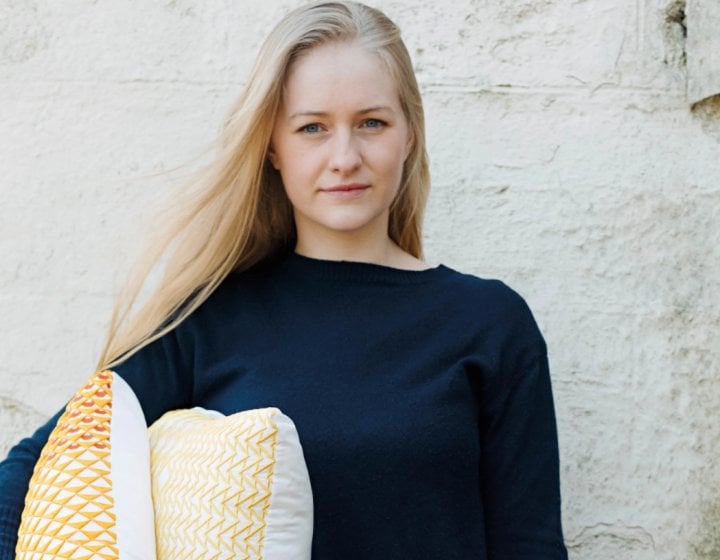
Natural Innovation: the Falmouth designer reimagining textiles with biomaterials
11 July 2025
Alice Selwood is a multitalented creative. After graduating from Falmouth’s Textile Design BA in 2...
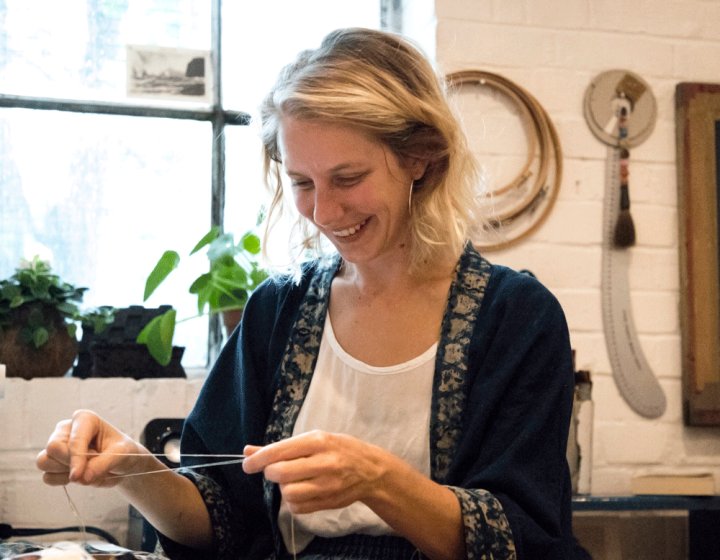
From the Royal Opera House to Broadway: an interview with textile designer Sara Lowes
17 March 2025
From creating headdresses for the costume archive of London’s Royal Opera House, to designing mous...
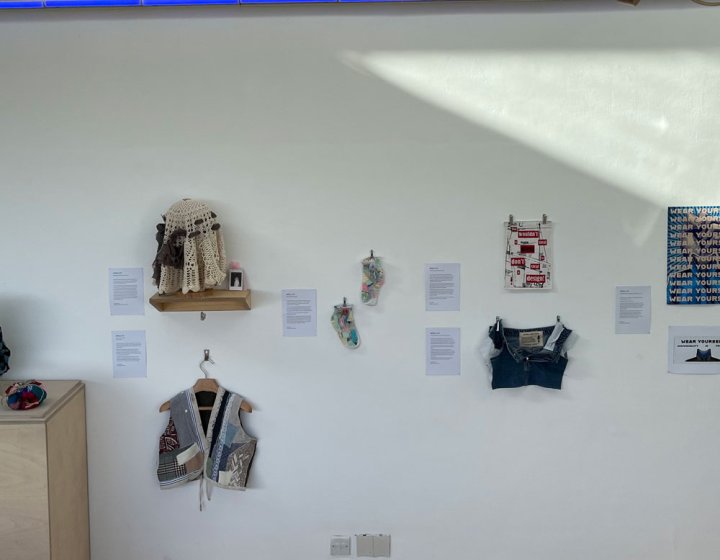
Fashion and Textile students’ work displayed at Newlyn Art Gallery & The Exchange
12 February 2025
Students across Falmouth’s Fashion & Textiles Institute have been selected to have their work feat...
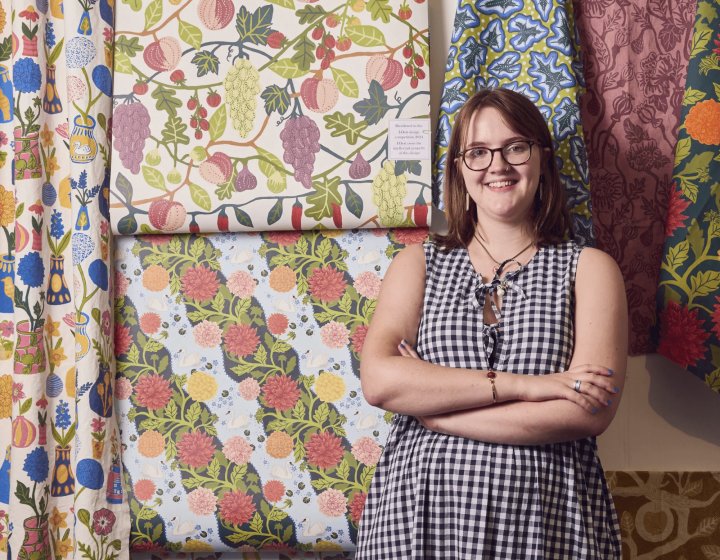
Graduate Spotlight: Textile Designer Lucy Martin
03 February 2025
Nature-loving textile design graduate Lucy Martin’s career has got off to an exciting start. Hot o...
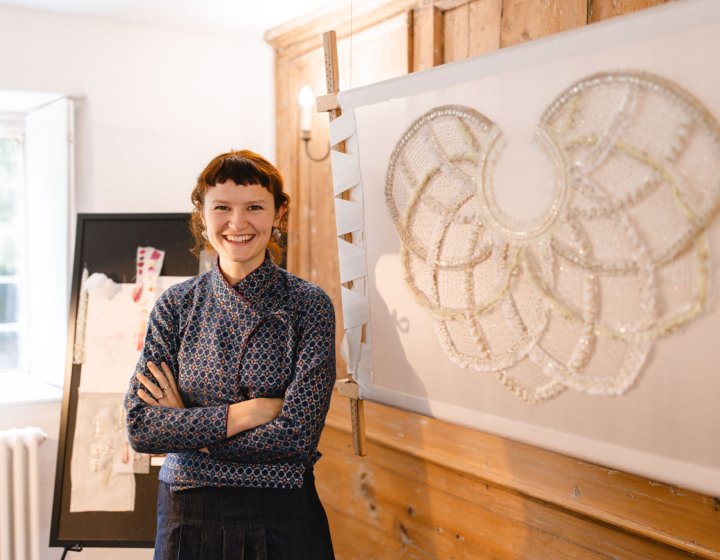
Credit: Oliver Holmes
From CHANEL to Queen Camilla: a catch-up with Textile Design graduate Beth Somerville
10 December 2024
2023 was a big year for Textile Design BA (Hons) graduate Beth Somerville. From being named overall ...
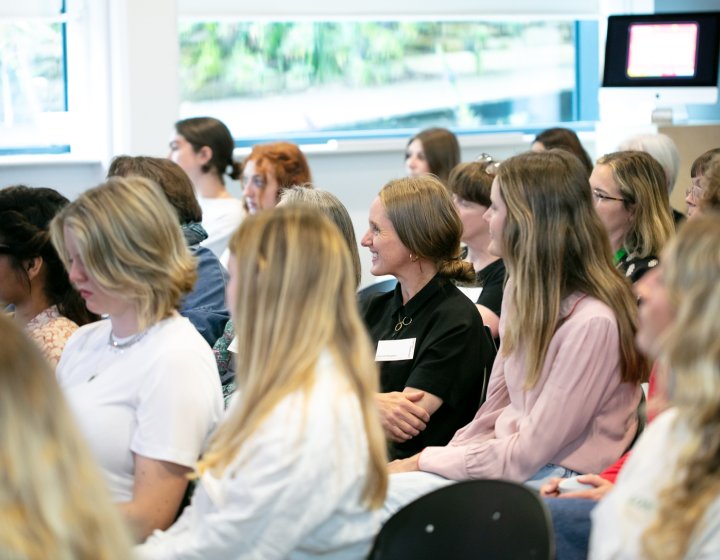
Credit: Matt Jessop
Fashion & Textiles Institute host inaugural Fashion Redesign Forum
26 September 2024
A team of senior lecturers, students and senior technicians from Falmouth’s Fashion & Textiles Ins...
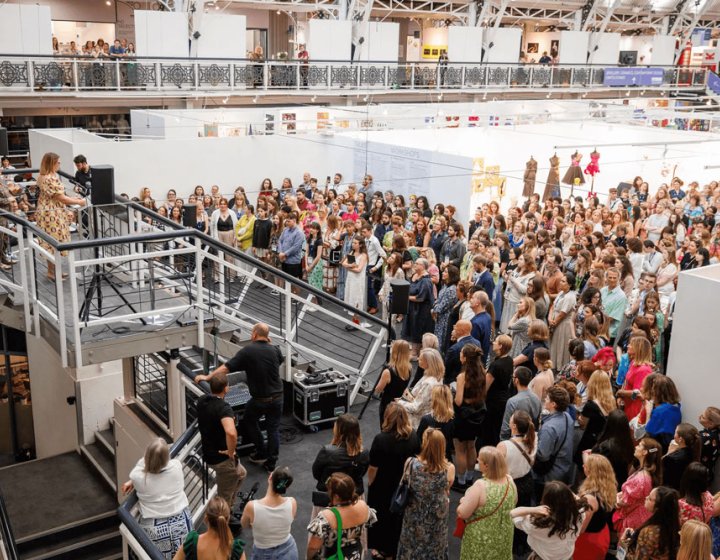
New Designer awards fruitful for five students
12 July 2024
The prestigious annual New Designers awards are judged by key industry leaders to find the rising s...
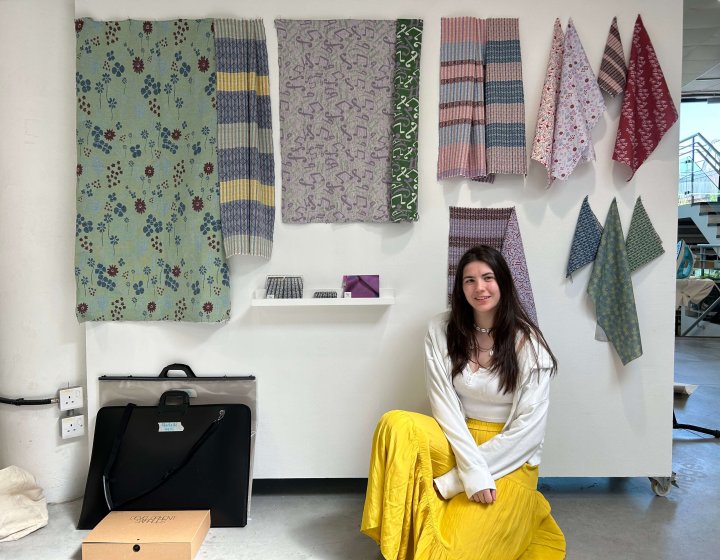
Textiles graduand secures job at historic silk mill
24 June 2024
Textile Design BA graduand Charlotte Wells will become a Mill Assistant at Whitchurch Silk Mill - th...
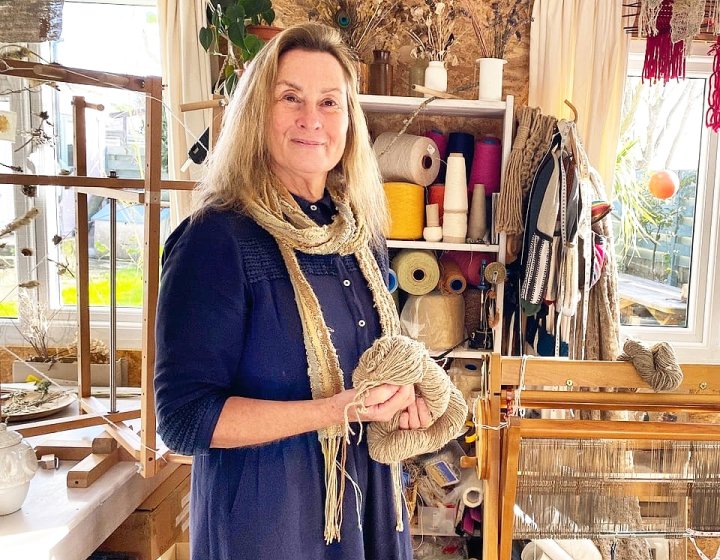
Textile Design BA graduate and Nettle Revolution founder wins the Theo Paphitis, Small Business Sunday Awards
22 May 2024
In an inspiring event earlier this year, Jane Gray, Founder and Coach of health and wellbeing compan...
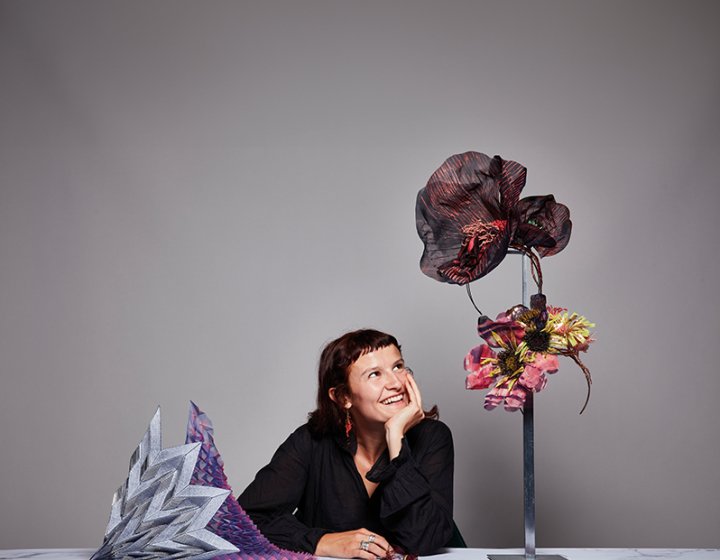
Putting the tech into textiles: Meet Falmouth graduate Beth Somerville
03 April 2024
From being named overall winner of New Designers 2023 to being selected for the Chanel and King’s ...
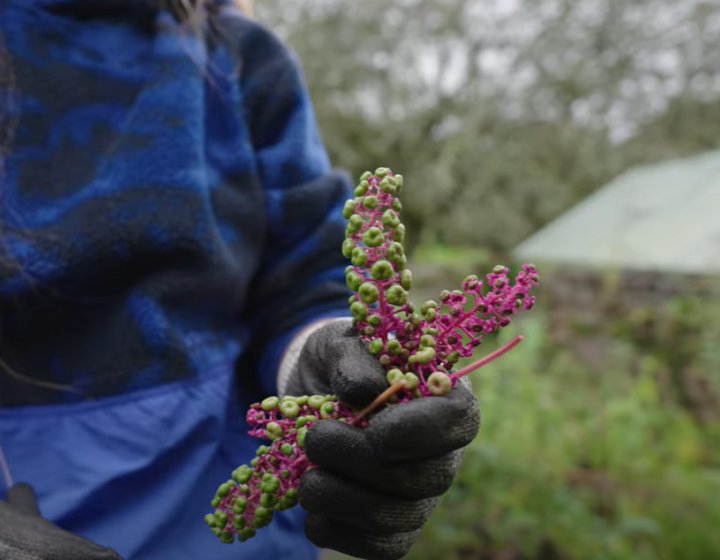
Inside our natural dye garden and labs
22 December 2023
Explore our natural dye garden and dye labs with senior teaching technician Alice Selwood.
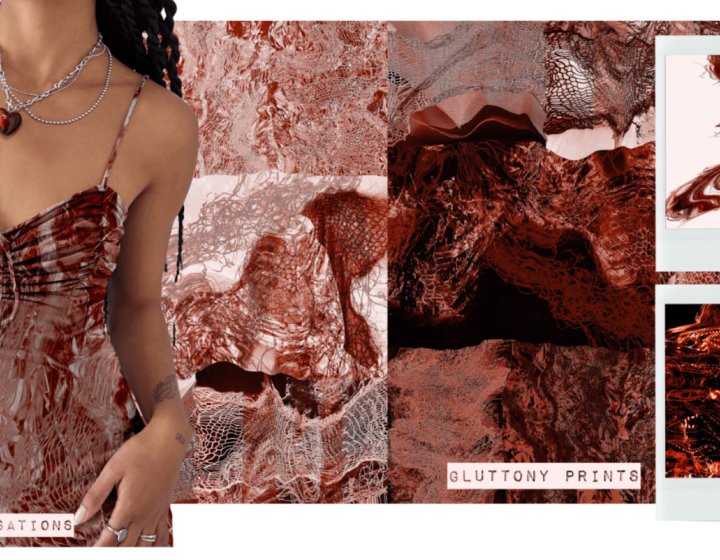
Falmouth graduate shortlisted at Global Design Graduate Show x Gucci
06 October 2023
See the shortlisted work and cast your vote!
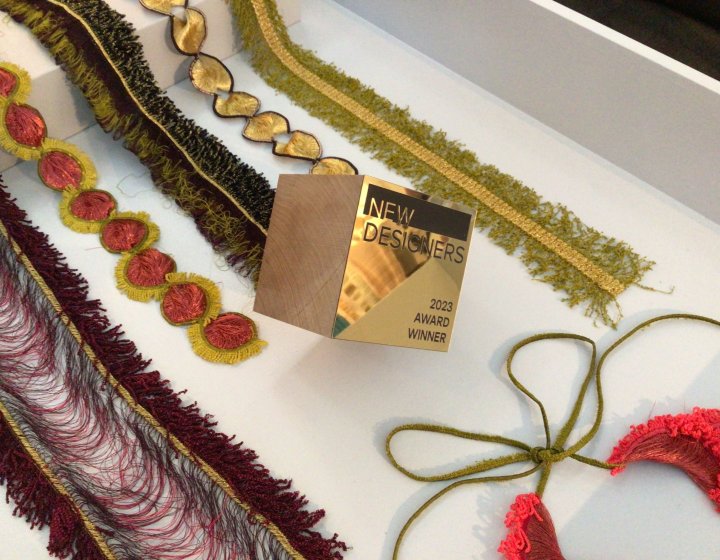
Graduating Textile Design student announced as overall winner of New Designers 2023
05 July 2023
Graduating student Beth Somerville and Falmouth University take home awards from New Designers 2023....
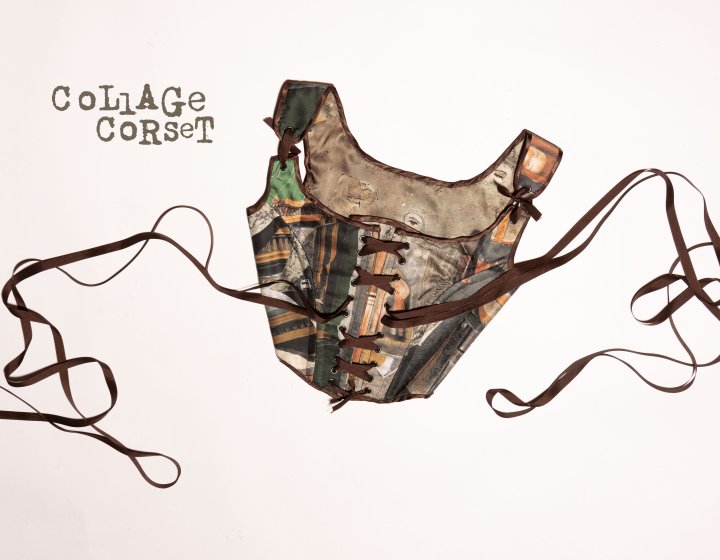
Final year Textile Design student finds inspiration in unlikely places
27 June 2023
Explore the work of graduating Textile Design BA(Hons) student Zahra Jelassi.
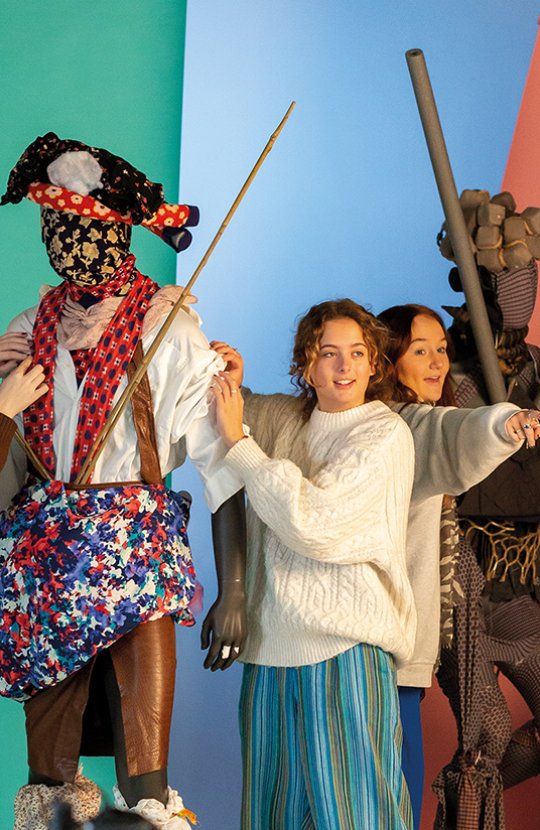
Virtual tour
Discover where you’ll spend your time as a student with our 360° tour, showcasing our facilities, accommodation, town and scenery.
Facilities
- Specialist industrial sewing, embroidery and embellishment machines
- Open-plan, collaborative studio
- Table looms and mechanical and electronic dobby floor looms
- 7-metre-long screen-printing tables and dedicated space for block/ mono/ transfer/ cyanotype printing
- A productive natural dye garden within the campus walled garden
- Digital print facilities
- Laser cutting machines
- A dye lab with a range of vats of different sizes
- Excellent physical and online library resources including online access to sites such as WGSN
- Digital embroidery machines and associated ‘Wilcom’ software
- Power jacquard ‘dataweave’ loom and digital TC2 Jacquard loom and ‘Scotweave’ software
Alice Selwood, senior teaching technician in the Fashion & Textiles Institute, tells us about Falmouth's natural dye garden and how the students incorporate it into their work.
Explore all fashion and textiles facilities
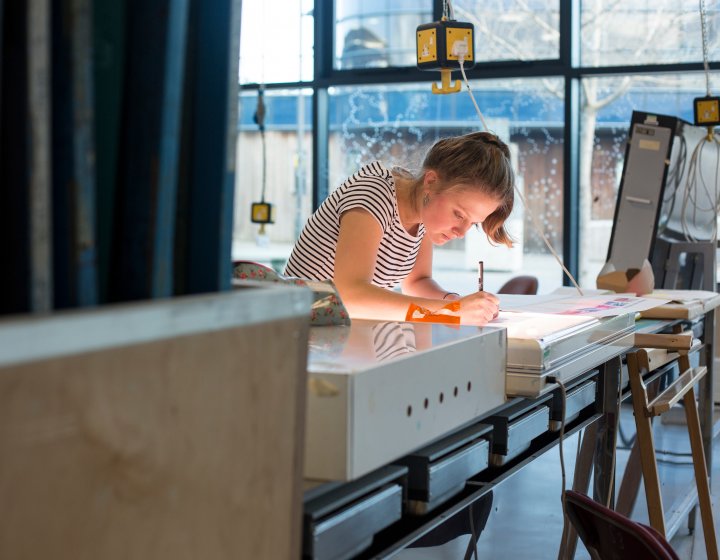
Fashion & Textiles Facilities
Centred around studio spaces that cater for solo and group working, our Fashion & Textiles Insti...
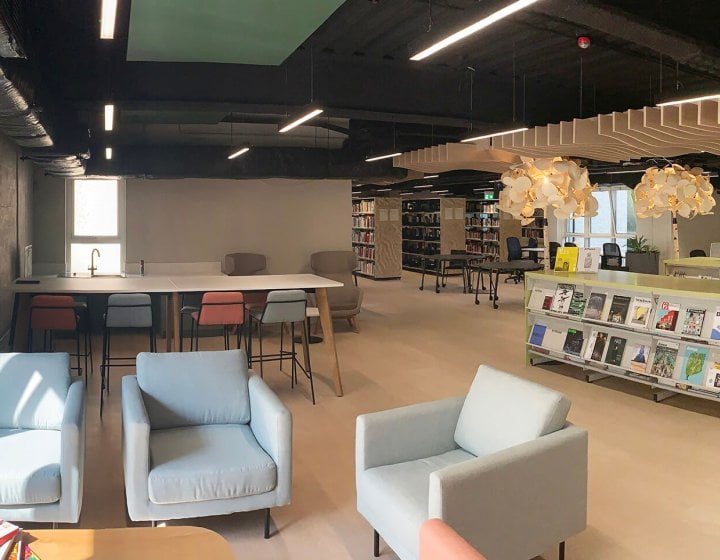
Library Facilities
Offering extensive collections, our two libraries provide a wealth of digital resources, magazines, ...

Sports Centre
Our Sports Centre, on Penryn Campus, includes a spacious gym with up to 90 of the latest, new statio...
Staff
You’ll be taught by a team of industry professionals and technical instructors, bringing experience in areas like weave, contemporary culture, fashion and interiors, public exhibitions, national and international research projects, and writing textile design books.
The Textile Design course team are enthusiastic about creating a more sustainable textile industry and aim to nurture a mindset of responsible, and creative professional approaches to textile design and production.
Some members of staff only teach on specific modules, and your course might not feature every staff member who teaches on the course.
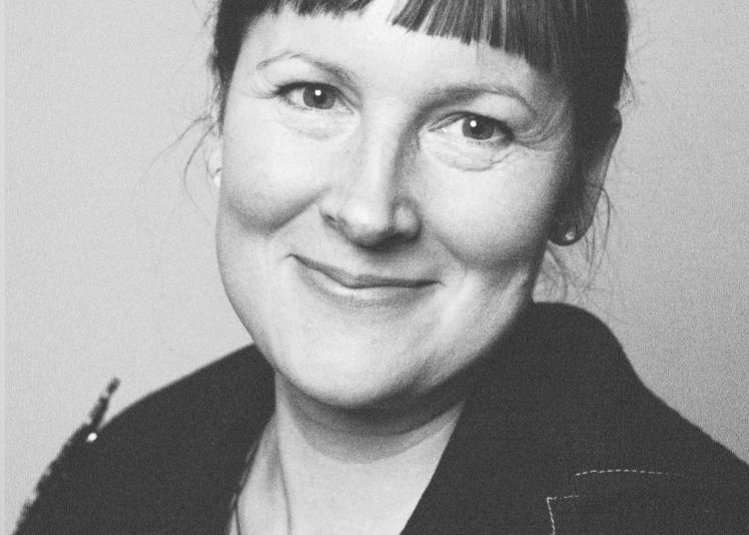
Sally-Ann Gill
Course Leader, Textile Design
Sally-Ann studied Textiles at UCA Farnham, followed by a Masters at the Royal College of Art special...
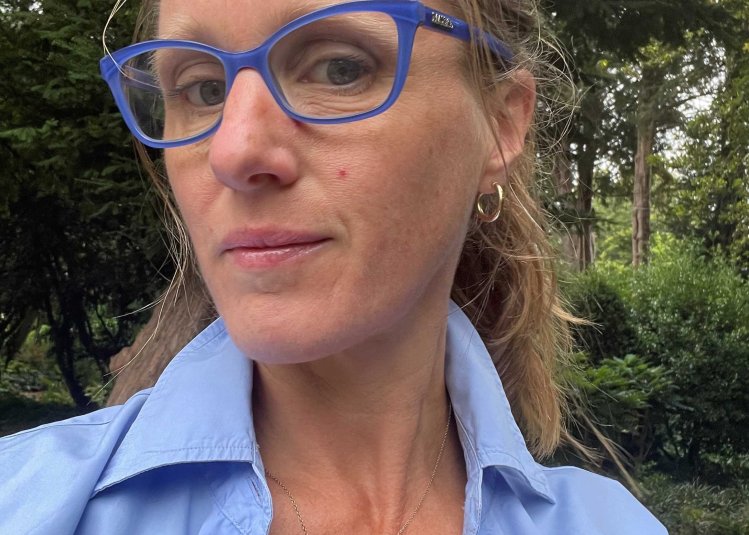
Hannah Maughan
Senior Lecturer, Textile Design
Hannah studied at Birmingham Institute of Art & Design and the Royal College of Art, specialisin...
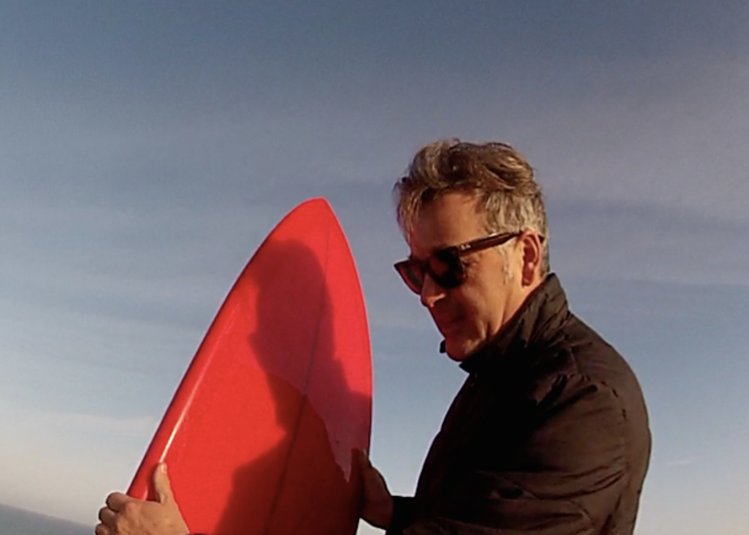
Dr Simon A. Clarke
Senior Lecturer
Dr Simon A. Clarke's PhD, Motif, Pattern, Colour and Text in Contemporary Kanga Cloth involved fie...
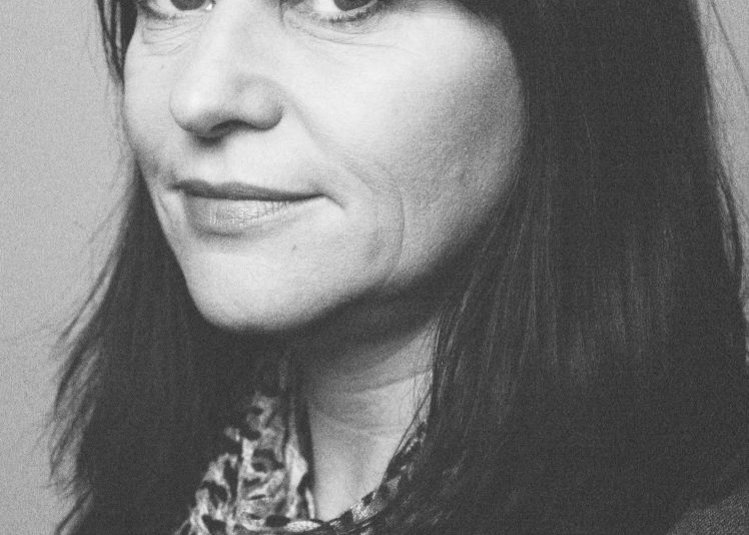
Dr Julie Ripley
Course Leader, BA(Hons) Costume Design for Film & TV
Dr Julie Ripley is a senior lecturer and course leader for BA(Hons) Costume Design for Film & TV...
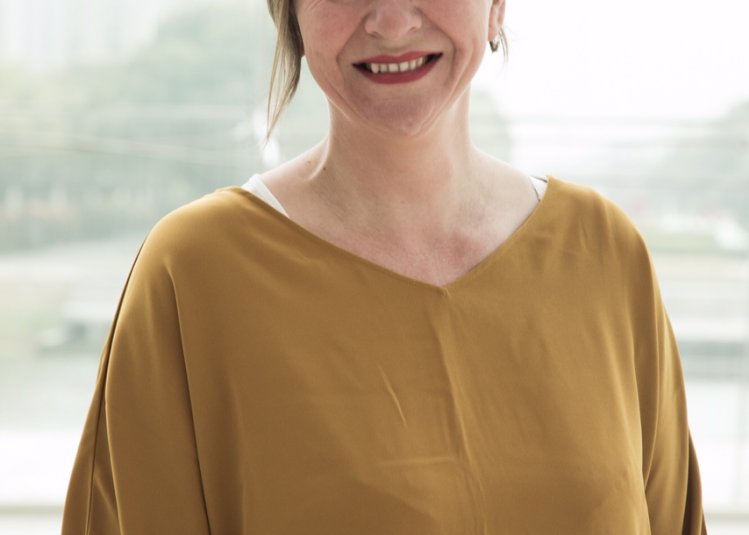
Dr Kate Strasdin
Senior Lecturer
I joined Falmouth in 2009 as an Associate Lecturer, teaching across the fashion and textile undergra...
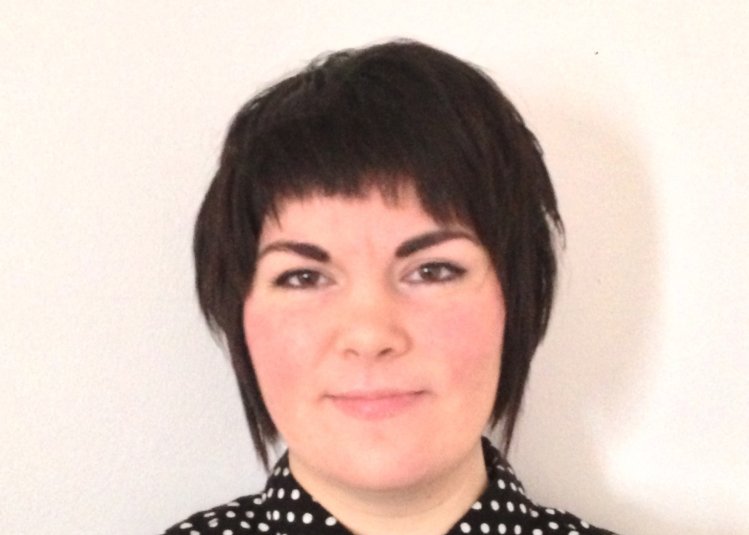
Freya Moses
Senior Technician, Printed Textiles
I work as a senior technician within the Fashion & Textiles Institute. I specialise in printed t...
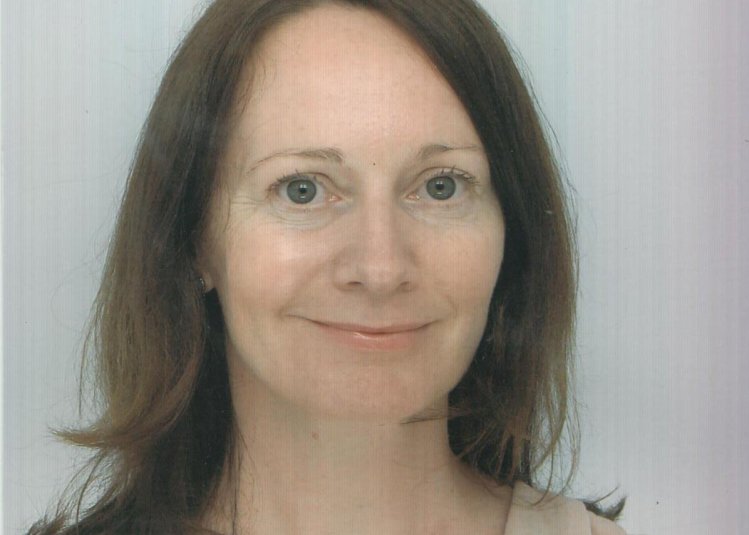
Wendy Kotenko
Senior Technician weave, The Fashion & Textiles Institute
Wendy Kotenko is senior technician for weave on the textile design programme. She has an MA in Texti...
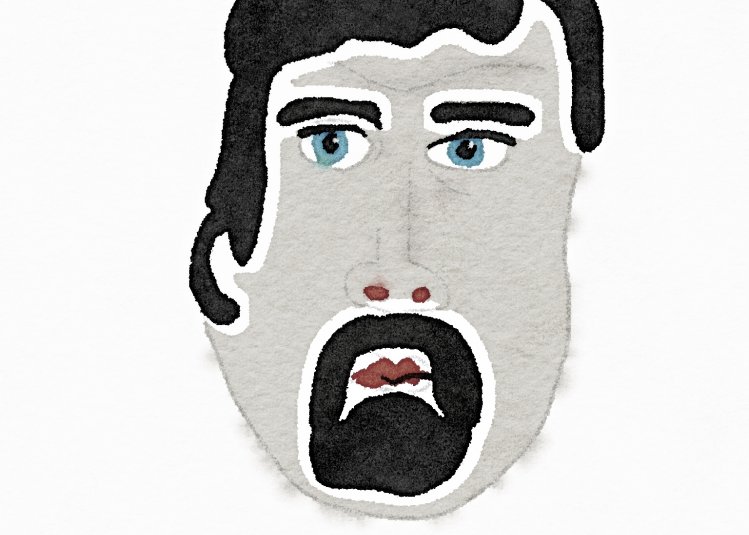
Adam Allen-Foord
Senior Technician
I started my professional life literally falling off horses for a living and I have spent the many y...
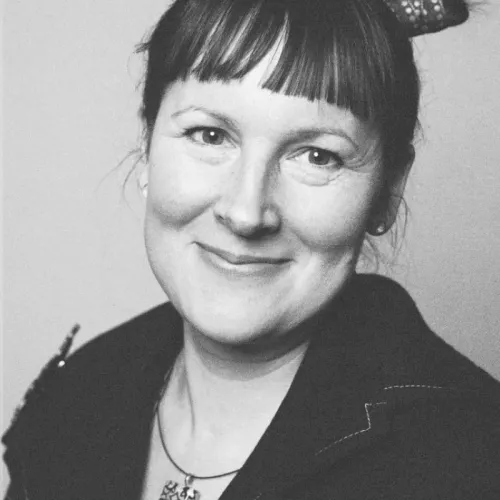
Got a question about this course?
If you want to know more about the course structure, our application requirements or what our graduates have gone on to achieve, our friendly course team is here to help.
Chat to SallyCareers
Our Textile Design graduates have worked as:
- Company Owner, Anna Glover
- Product Developer at Toast
- Colour, Materials and Finish Designer at Dyson
- Textile Designers at Boden, H&M, Joules & Burberry
- Creative Assistant at Colour Hive
- Woven Development Engineer at Heatcoat Fabric
A degree in Textiles offers you the chance to build a portfolio and gain valuable work experience so you’re ready to enter industry when you graduate.
How to apply
Ready to apply for 2026?
You can apply for our undergraduate degrees via UCAS. You'll need our university UCAS code (F33) as well as your course code (which you'll find on your course page) for your application.
Applying as an international student?
There are a number of different ways to apply to study at Falmouth as an international student. Find out how you can become part of our creative community.
| Course route | UCAS code |
|---|---|
| Textile Design BA(Hons) three year degree | W230 |
| Textile Design BA(Hons) with Integrated Foundation Year | FY17 |
| Textile Design BA(Hons) with professional placement | PY24 |

Application advice & interview information
Go to ToolkitFor starting your studies in 2026
UK applications: 14 January 2026 (for equal consideration)
Applications after the 14 January will be considered on a first-come, first-served as long as there are places available. Apply for this course now.
For starting your studies in 2027
UK applications: 13 January 2027 (for equal consideration)
International fee payers
International fee payers can apply throughout the year. But we recommend applying as early as possible, to make time for visa and travel arrangements.
We consider all applications on their own individual merit and potential.
Our diverse community is creative, innovative and entrepreneurial. We recognise that these qualities aren’t always shown in academic grades alone. That’s why, while many of our applicants achieve high academic grades, we also welcome those who can demonstrate their potential through an exceptional portfolio or performance.
We welcome applications from all subject backgrounds, whether you’ve specialised in STEM, the arts or humanities. Find out more about our Entry Requirements here.
Course routes & entry requirements
BA/BSc(Hons) three year degree: minimum 64 UCAS Tariff points
BA/BSc(Hons) four year degree with professional placement: minimum 64 UCAS Tariff points
BA/BSc(Hons) four year degree with Integrated Foundation Year: minimum 32 UCAS Tariff points
At Falmouth, we'll consider the equivalency of your specific qualifications against our entry requirements and support you through your application journey.
View our International Entry Requirements
Language requirements
For applicants whose first language is English we require you to have or be working towards GCSE English Language Grade 4 (C), or equivalent.
If English is not your first language you will need to meet the same standard which is equivalent to the IELTS Academic 6.0 overall score, with at least 5.5 in Reading, Writing, Speaking and Listening. We accept a range of in country equivalencies and approved tests.
If you need a student visa to study in the UK, you may need to take a recognised language test. You can read our English Language Requirements for more information.
Fees, costs & funding
Tuition fees
| Annual tuition fee | Student |
|---|---|
| £9,790 per year | Full-time UK |
| £19,950 per year | Full-time EU/international |
| £1,955 per professional placement year | Full-time UK and EU/international |
| £9,790 per Integrated Foundation Year | Full-time UK |
| £19,950 per Integrated Foundation Year | Full-time EU/international |
| Annual tuition fee | Student |
|---|---|
| £9,535 per year | Full-time UK |
| £17,950 per year | Full-time EU/international |
| £1,905 per professional placement year | Full-time UK and EU/international |
| £9,535 per Integrated Foundation Year | Full-time UK |
| £17,950 per Integrated Foundation Year | Full-time EU/international |
Tuition fees for September 2027 will be confirmed in summer 2026.
Tuition fees are set annually and are subject to review each year. The University may therefore raise tuition fees in the second or subsequent years of a course, in line with inflation and/or the maximum permitted by law or Government policy. Students will be notified of any changes as soon as possible.
The figures above don't include accommodation and living costs
Typical course costs
- £150 - Studio kit if not already owned, including: drawing pencils, gouache paints, brushes, palette, masking tape, sewing threads, A2 folder, A4/3 sketchbooks, paper, fabric/paper scissors, sewing needles.
- £500-£800 - Laptop or tablet, optional USB stick
- Additional costs of specific disciplines may be necessary
- £200 - Studio materials fee, one-off for your whole period of study
- £300-£600 - Second and third year project materials
- £700-1000 - Optional study visits and placements for the course duration
If you need to bring equipment or materials with you, these will be outlined in your Welcome Letter.
Essential workshop items
You probably already have many items on this list, however, if you need to buy all these items from scratch, it will cost approximately £150. Current students recommend Hobbycraft for many items:
- Range of drawing pencils
- Gouache paints - ensure these are good quality paints with a high pigment content such as Windsor & Newton. (Current students recommend ‘Arteza’ and ‘Seawhite’). You will need these colours in the first week of study:
- White (large tube essential)
- Lemon yellow (or any bright yellow)
- Marigold yellow (or any orange)
- Magenta
- Spectrum red or primary red
- Ultramarine blue or primary blue
- Viridian green or a similar green
- Burnt umber
- Black
- A range of brushes
- White palette for mixing paints
- Masking tape and double-sided tape
- Sewing threads - a small range
- A2 folder (a transparent plastic portfolio folder can be bought in the University shop)
- A3 sketchbooks (can be bought in the University shop)
- A range of good quality paper for drawing
- Fabric scissors
- Small sharp-pointed scissors, kept for fabric and thread only
- Paper scissors
- Sewing needles, a variety of sizes
- (Optional) You may also consider a USB stick or hard drive for backing up your work.
Note that once you have settled into a main discipline area (weave, print or mixed media) there will be essential equipment that you will need to purchase such as shuttles, threads, needles, pins.
Studio materials charge
We ask students to pay £200 in the first week to cover the cost of studio materials e.g. use of dyes, print pastes and chemicals, and other miscellaneous items. This covers all three years and is a one off payment. You will also need to purchase fabrics and yarns and some specialist printing pastes as the course continues, but this cost varies from student to student depending on fabric/yarn choices and methods used.
Some students spend £600 or more on additional materials in their final year, but it is possible to spend more or much less than this, depending on the processes used. We would expect year two costs to be less and recommend that second year students budget around £300 for materials.
Work placement (optional)
Short work placements and internships, generally undertaken during your second year, are very much encouraged, but are not required to pass the course. The costs of travel, accommodation and living should be factored in for this. Some placement providers may cover a limited amount of expenses, but this is not guaranteed.
New Designers Exhibition, London (optional)
We aim to exhibit our best students at New Designers in the summer following your third year. The University covers some of this cost, but students also need to contribute towards the cost of the stand and van hire to transport to and from London. As a guide, the students this year are contributing £400 each. We encourage students to fund raise as a cohort to help reduce this cost.
Study trips
We run overseas study visits from time to time in the second and third years of the course. Recent visits have been to important international trade fairs such as Première Vision in Paris. Trips such as this are optional, and we work hard to secure the best deals for accommodation and travel. Prices will vary at the time we organise the trips but as a guide, a trip we are planning to Amsterdam will cost approximately £500, including travel from London and accommodation, but not food.
Additional typical course costs for Integrated Foundation Year pathway
- £250 for materials
- A laptop/desktop computer
- Adobe Creative Suite
To engage in the digital learning activity, although you will be able to access IT suites on campus, you will benefit from a laptop to access the platforms and tools we use. Depending on your subject, you may need a specific type of computer. If you're unsure about what you might need, please contact our course advisors.
Course equipment and costs
You will be recording your creative progress and writing about your work throughout the Integrated Foundation Year and so a laptop computer and a smartphone are highly recommended.
Typical course material costs:
- £250 - Recurring annual costs may include: art/creative materials and costs towards your end of year show exhibition and can vary depending on material choices and specialism.
Study trips:
There are several field trips, and you will need to allow for some costs for student contributions towards coach hire and exhibition entry. Total annual cost of day trips approximately £60.
If you want to attend the planned week-long residential trip to London in the Spring of 2026 then you will need to plan for a £100 deposit payment shortly after arriving on the course, to secure a place, and to budget for a total trip cost of approx. £400 - to be paid in instalments.
Funding
For information about funding available, please visit our student funding pages.
Ask a student
What better way to find out about life at Falmouth University than by asking our current students?
From course details and academic support, to the social scene and settling in, our students are ready and available to answer any questions you might have. Simply set up your account, send them a question and they'll get back to you within 24 hours.
Similar courses
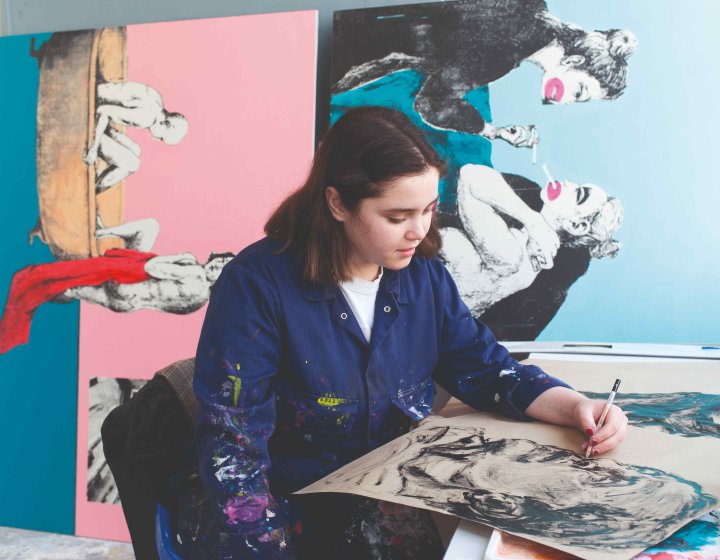
Fine Art BA(Hons)
This highly-respected course aims to support the development of your practice as it evolves over the...
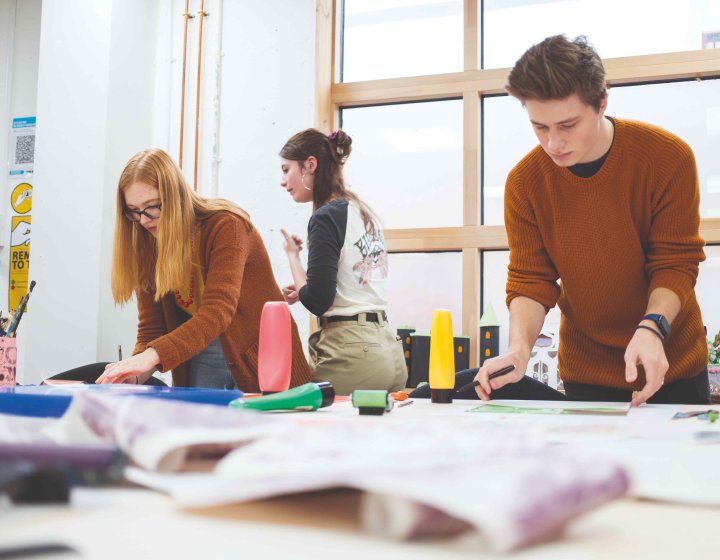
Illustration BA(Hons)
Become adept at problem solving and creating your visual language on this Illustration degree, renow...
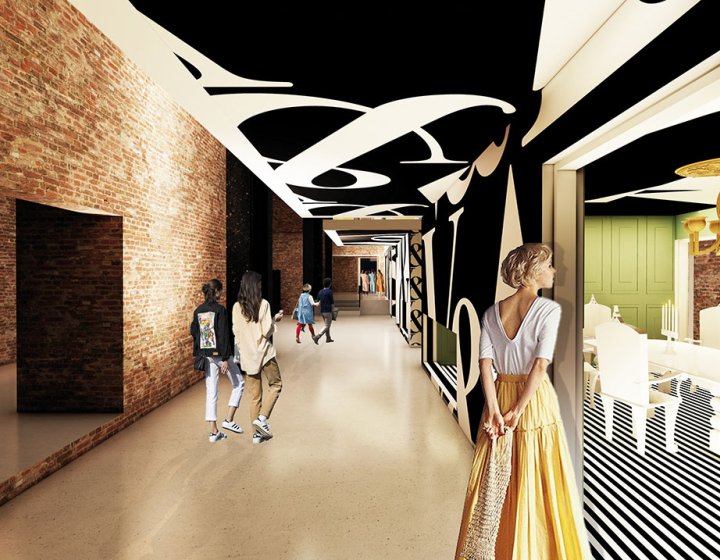
Interior Design BA(Hons)
Delve into the world of built spaces, interior environments and the people who inhabit them. Through...
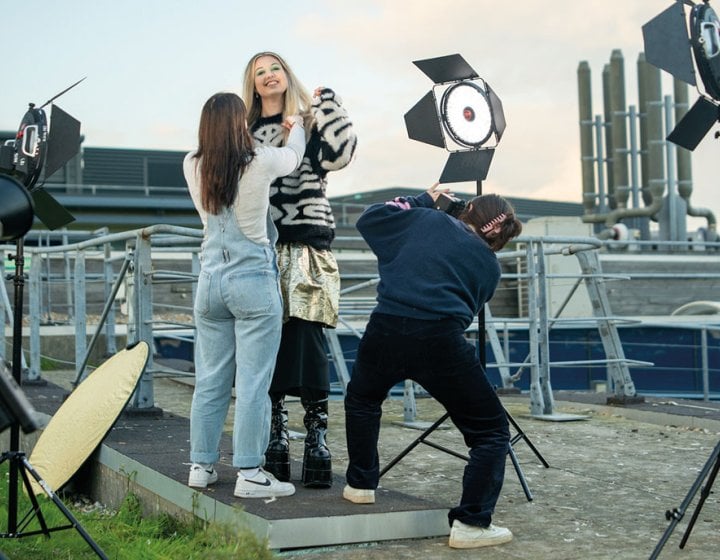
Fashion Styling & Art Direction BA(Hons)
Influence the shape of fashion as you take on the world of fashion styling. On this future-focused c...
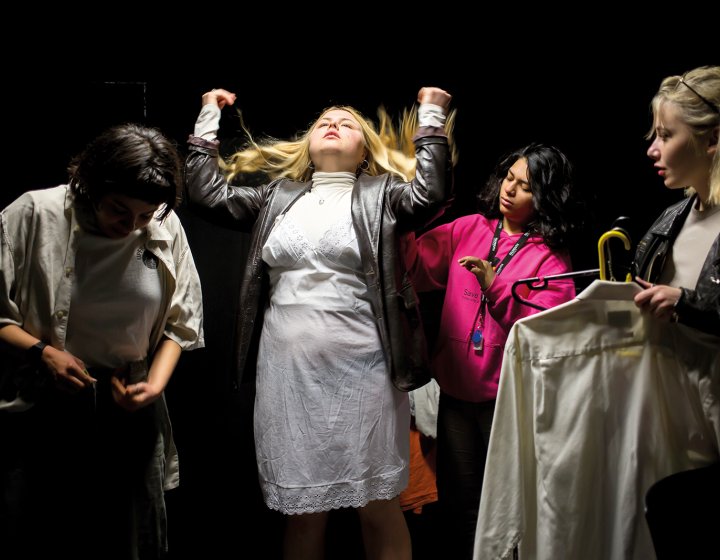
Costume Design for Film & Television BA(Hons)
On this dynamic course, you’ll cultivate the practical, creative and theoretical skills needed to ...
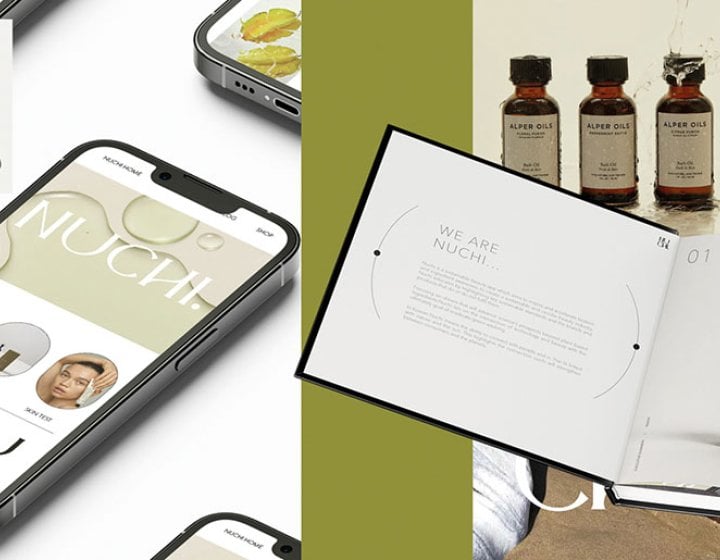
Fashion Marketing BA(Hons)
Blend your flair for communication and eye for fashion into a successful career as a fashion markete...
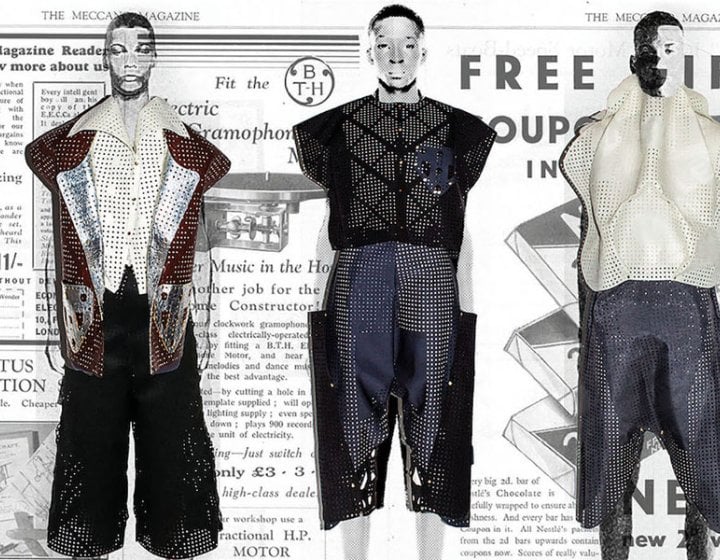
Fashion Design BA(Hons)
Turn heads and change minds as you steer the fashion industry toward a more sustainable future. Work...
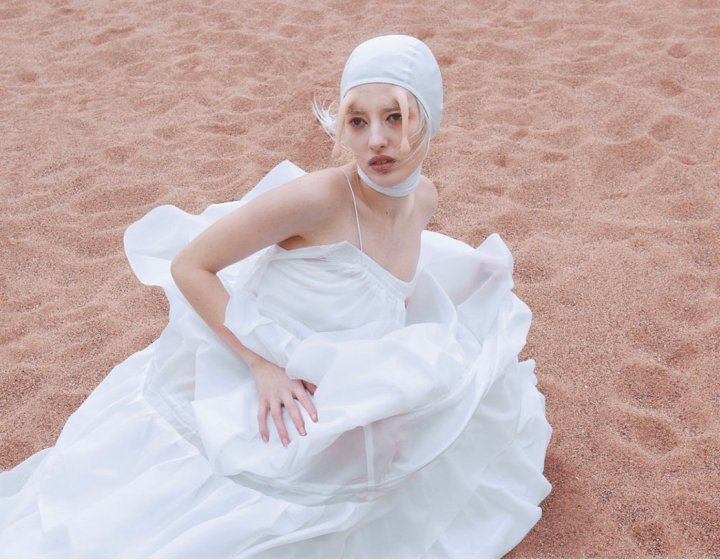
Fashion Photography BA(Hons)
Develop your unique artistic voice and springboard into the industry as an innovative fashion photog...
Open Days and events
From visiting campus to online application advice, get all the information you need about joining our creative community.
Find an event
